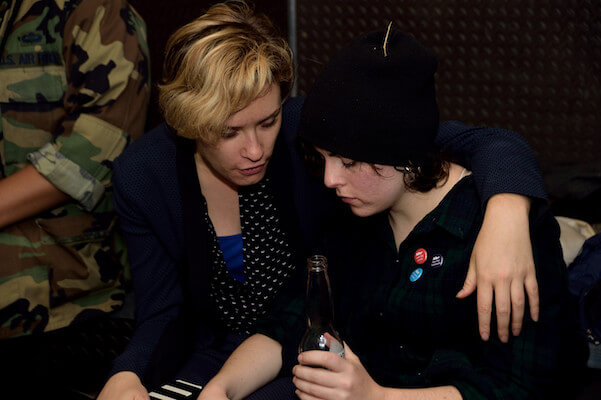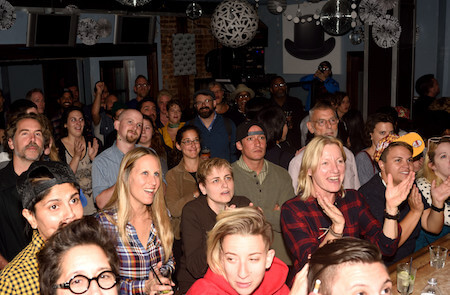BY PAUL SCHINDLER | The weird thing is this: She was there.
In May 1992, Bill Clinton appeared before more than 600 gay, lesbian, and AIDS activists at Los Angeles’ Palace nightclub. Veteran gay journalist Bob Roehr characterized it as the first time a major presidential candidate publicly addressed an LGBT audience. In the Los Angeles Times, Ron Brownstein reported that Clinton pledged a “Manhattan Project” to cure AIDS, an end to the military’s ban on openly gay and lesbian service members, and nondiscrimination protections based on sexual orientation.
That LA appearance, which longtime activist David Mixner, a Clinton friend dating back decades, helped organize, was key to Mixner’s success that year in raising what he said was more than $3 million in gay money for the Arkansas governor’s campaign.
The Palace fundraiser, however, did not arise in a vacuum. Seven months earlier, Clinton made a more intimate visit to Dr. Scott Hitt’s home in the Hollywood Hills, where he met wealthy friends of the gay physician associated with Access Now for Gay and Lesbian Equality, or ANGLE. Multiple press reports, including a recent retrospective by veteran LA lesbian journalist Karen Ocamb, indicate that Governor Clinton was joined that evening by Hillary.
ANGLE had already met with Massachusetts Senator Paul Tsongas, considered a top tier presidential rival of Clinton’s, and many of its members, Mixner recalled, were leaning toward him. “I would say to almost a person, they were for Clinton when he left,” Mixner told the Washington Post in early 1993.
It didn’t hurt that California Republican Governor Pete Wilson’s recent veto of a gay rights bill offered Clinton the chance to argue it was a measure he would have signed. But Ocamb said the most salient factor in Clinton winning over the group was his agreement to a “stipulation” that he “speak about AIDS at a major public venue.” Clinton delivered on that ask the following May at the Palace.
Between those two events in California, Clinton had a very different interaction with a gay man, this time in New York. In March 1992, at a fundraiser at Midtown’s Laura Belle nightclub, Clinton was confronted by Bob Rafsky, a member of ACT UP who would die from AIDS-related causes less than a year later. According to a New York Times transcript, Rafsky told Clinton, “This is the center of the AIDS epidemic, what are you going to do? Are you going to start a war on AIDS? Are you going to just go on and ignore it? Are you going to declare war on AIDS? Are you going to put somebody in charge?” After a bit of back and forth, Rafsky added, “Bill, we’re not dying of AIDS as much as we are from 11 years of government neglect.”
Clinton was clearly shaken by the exchange, at one point saying, “Let me tell you something. If I were dying of ambition, I wouldn’t have stood up here and put up with all this crap I’ve put up with for the last six months.”
According to an account from Dr. Hitt –– who would go on to become the first chair of Clinton’s Presidential Advisory Council on HIV/ AIDS –– reported by journalist Roehr, as Clinton got ready to go on stage at the Palace in LA two months later, he was told that half of the audience was HIV-positive and would likely be dead within a few years. “The candidate's eyes went wide,” Roehr wrote. Clinton would tell the crowd, “I have a vision and you’re part of it” –– words that carried incredible political force with the LGBT community of that time.
Hillary Clinton was by her husband’s side every step of the way during the 1992 campaign. She knew full well that “President and Mrs. Reagan –– in particular Mrs. Reagan” had not “started a national conversation when before nobody would talk about it, nobody wanted to do anything about it” because Hillary heard that first-hand from activists in real time. Bill Clinton, in that searing New York moment, had been told gay men were dying “from 11 years of government neglect.” She knew ANGLE’s willingness to endorse her husband and help raise funds was predicated on his willingness to end the neglect, to end the silence.
The Reagans’ record on AIDS, tragically, was not how Hillary Clinton described it last week. Ronald Reagan did not utter the word publicly until September 1985, more than four years into the epidemic. As Buzzfeed’s Chris Geidner has noted, early that year, Reagan tried to cut the federal AIDS budget by $10 million, to $86 million, even though more than 5,500 Americans were already dead. The president first addressed AIDS in a major speech in 1987, at the time his vice president was calling for mandatory HIV testing.
Geidner, last year, reported that Nancy Reagan turned down Hollywood pal Rock Hudson’s 1985 request that the White House intervene to help him get into a French military hospital where he believed he might find help. Just over two months later, Hudson was dead.
Hillary Clinton quickly apologized for her Reagan comments –– and hours later did again. In her second, longer statement, she acknowledged the hurt her comments caused and that it was activists, standing up to the silence of officialdom –– first and foremost, Ronald Reagan –– who got the nation talking about AIDS. Clinton also showed an astute understanding of where the epidemic stands today –– that poverty and marginalization continue to be tied to HIV transmission and lack of treatment; that HIV criminalization gets in the way of prevention and treatment; and that PrEP offers a way to dramatically alter the epidemic’s course.
The takeaway here is not Hillary Clinton’s fluency in the history of AIDS or whether she will embrace the right answers to the ongoing epidemic. The real issue is how top of mind AIDS is for her. Her blunder about Nancy Reagan is mystifying mostly because she knows better. But handed really inept talking points last week as she arrived at the Reagan funeral, Clinton was insufficiently focused to realize how wrong-headed they were.
Our job is to keep her and the administration she may well head come January focused. Beating AIDS is not about the right words or the even the right policies, it’s about follow-through consistently pursued.
That’s why –– so many years down the road –– we all need to remain AIDS activists.


































